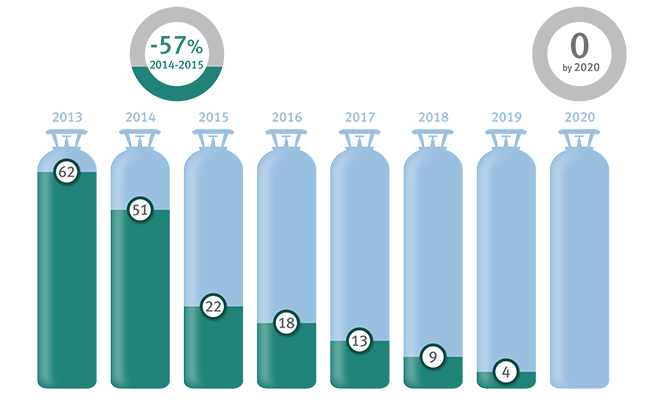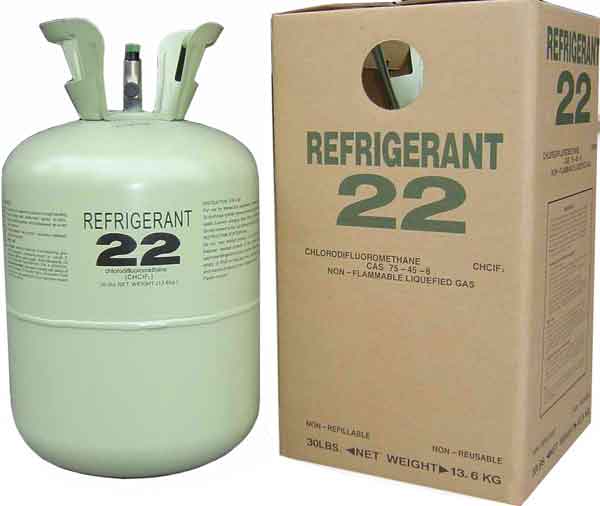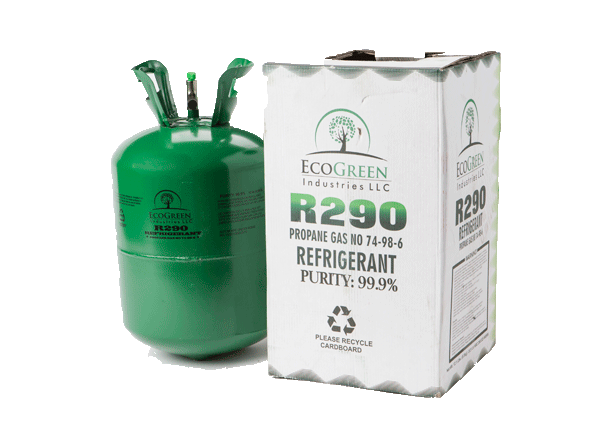
With an increased awareness of environmental changes and conditions, the end of refrigerant production containing Ozone Depleting Potential (ODP) like R-22 has been dramatically shortened. The reduced production is resulting in both a sharp increase in its cost and counterfeiting of replacement refrigerant. The unapproved usage of replacement refrigerants is tempting and extremely dangerous.
R-22
From data center cooling units using hundreds of pounds all the way up to 500-ton air cooled chillers with over a 1,000 pounds, R-22 is the most prevalent refrigerant used in cooling equipment within the U.S.A.

Why R-22 is Being Phased Out
R-22 is being phased out because the refrigerant is a hydro chlorofluorocarbon, meaning it is an ozone-depleting chemical. Efforts to reduce ozone depletion began with the signing of the Montreal Protocol. However, the phase-out schedule for R-22 didn’t begin in the U.S.A. until 2004. Use of R-22 in new appliances has already been banned, but using R-22 to service existing units is still permitted. By 2020, manufacture of new R-22 will be banned, but recycled or reclaimed fluid may still be used to service existing equipment.
What is a Counterfeit Refrigerant?
A counterfeit refrigerant can be something unassuming such as an untrained technician reusing dirty gas recovered from a failed system, to a more intentional and dangerous act of using a non-approved product or mixture of chemicals in place of approved coolants. The most frequent counterfeiting method with R-22 is to use Propane (aka R-290) in its place.
R290 Propane
The gas that most of us all know and have used for cooking, heating, camping lights and soldering is being used in place of the more expensive R-22. While Propane is listed and approved for use in small refrigeration systems, it has a ZERO (0%) ODP listing and not approved in central cooling or commercial equipment. It preforms almost identical to R-22 from the temperatures and pressures all the way down to capacities and oil compatibilities. With the use of Propane in place of R-22 pm the rise without the knowledge of end users, risk of an incident is exponentially increased.

Why R290 is not an Approved Alternative for R-22
The risk of replacing R-22 with Propane is obvious. EXPLOSIONS! Propane explosions are deadly and in some cases large enough to destroy structures. If a tech was to put R-290 into a system without identifying it the results could be catastrophic! A lot of repairs to systems require use of torches (open flame), and a tech will have no way of knowing the system contains combustible gas until it’s too late. A small leak on the indoor coil could fill an area of the facility that could linger until ignited.
What to Do If Your Cooling Unit Uses R-22

1. Don’t Buy Coolant Online
There are plenty of cheap products that claim to replace R-22 on the market, however they are not approved by the EPA and are not safe for use. The FBI has issued a specific warning regarding a product called “Super Freeze 22a” which is manufactured in China and sold directly to consumers online so as to bypass government regulation.
In the Matter of Super-Freeze 22a and Other Flammable Refrigerants
2. Switch to an Approved Coolant
The EPA has compiled a list of approved substitutes for R-22, and is also constantly reviewing new products as they are developed to determine their impact on the planet and on human health. Contact your maintenance contractor for more information. One approved substitute you may consider is R-410A. This coolant does not contribute to ozone depletion.
3. Replace Old System
While it is wise to analyze your R-22 needs for the next few years, sometimes the most cost efficient solution is to replace legacy systems with more energy efficient units.
4. Use a Certified Contractor
In an attempt to combat this issue, the FBI has issued warnings and recommend only using local reputable contractors who have vetted vendors and supply chains. However, with online stores providing alternatives at costs far less than current R-22 prices, the temptation to substitute refrigerants is a real and lucrative practice that puts both the techs and clients at risk for catastrophic events.
With Keystone Critical Systems & Advisors, we never cut corners. We take pride in our work and the safety of both our skilled technicians and clients alike. We are a General and Mechanical Contractors dedicated to Data Center and Mission Critical Facilities. You can rest assured that with Keystone, your facility is being maintained with the proper refrigerants sourced from vetted vendors. Not sure what is in your lines?




